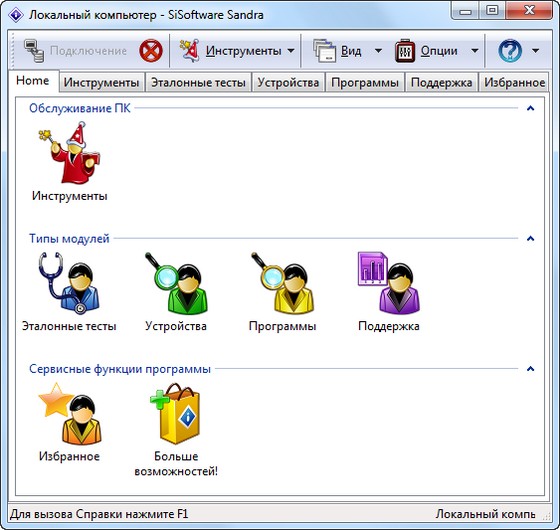SiSoftware Sandra Lite 2011 v17.15

SiSoftware Sandra - системный анализатор для 32-х и 64-битных версий Windows, включающий в себя тестовые и информационный модули. Sandra старается превзойти другие подобные утилиты и показать реальную картину, объединяя в одной программе возможности для сравнения производительности как на высоком, так и на низком уровне. Вы можете получить сведения о процессоре, чипсете, видеоадаптере, портах, принтерах, звуковой карте, памяти, сети, Windows, AGP, соединениях ODBC, USB2, Firewire, и других.
Key features:
- 4 native architectures support (x86, x64/AMD64/EM64T, IA64/Itanium2, ARM).
- 2 native GPGPU platforms support (AMD CTM/STREAM1, nVidia CUDA1, future Intel).
- 3 native Graphics platforms support (DirectX 9, DirectX 10/10.1).
- 23 established benchmarking modules, 4 new to version 2009.
- Huge official hardware support through technology partners (Intel, AMD/ATI, SiS, VIA/Centaur).
- 7 charting options: combined, components, performance vs. speed/power/cost, capacity vs. power/cost charts.
- 6 language versions (English, German, French, Italian, Russian, Japanese) thanks to our Translators.
- Enhanced Sandra Lite version (free for personal/educational use)

What's New in 2011:
New Benchmark: Media Transcode
Measures the transcoding bandwidth converting media from one format to another.
Why? Most devices cannot play video recorded by a camcorder. Such media would most likely require to be edited first and then to be transcoded (possibly transparently) when copied to a device for playback. With current high-definition media such an operation can be a lenghthy process, thus any performance improvements will save a lot of time.
Using the new Media Foundation in Windows 7, we measure WMV (e.g. Movie Maker) > MP4/H264 and MP4/H264 (e.g. phone video) > MP4/H264 using various profiles (HD TV 720p, SD TV 480p, tablet, phone, etc.).
The benchmark can compare the performance of hardware accelerated media transcoders (e.g. GPUs) with multi-threaded software (CPU) transcoders.
New Benchmark: GPGPU Cryptography
Measures the encryption, decryption and hashing bandwidth of GPGPUs
Why? While modern CPUs include special instruction sets (Intel AES, VIA PadLock) to accelerate cryptographic operations, are they a match for modern GPGPUs? The benchmark uses the same workload as the CPU Cryptography benchmark allowing direct comparison of modern CPUs and GPGPUs of the most common algorithms in use today (AES256, AES128, SHA256, SHA1).
OpenCL 1.x, DirectX 11 Compute Shader and CUDA3 3.x are supported. Multiple video cards are supported and CPUs can also be used in parallel in OpenCL. The benchmark allocates workload based on the respective processing power of GPGPUs and CPUs.
New Benchmark: Blu-ray
Measures the performance of Blu-ray optical drives
Why? While Blu-ray won the high-definition war some time ago, it has finally become affordable for computer users as a replacement for DVD. We have thus added a brand new Blu-ray Test Disk to measure the performance of the latest drives on the market, adding to the existing DVD and CD Test Disks which are still required to measure DVD and CD disk performance.
Updates:
AVX/FMA instruction set support for future CPUs
Processor Multi-Media, Processor Cryptography, Memory Bandwidth, Cache and Memory Benchmarks
Using 256-bit register width (instead of 128-bit of SSE/2/3/4) yields further performance gains through greater parallelism in most algorithms. Combined with the increase in processor cores and threads we will soon have CPUs rivaling GPGPUs in performance.
Measure each operation report min-max score as well as average
Why? The maximum time an operation can take is just as important as the average time; if the measured performance varies greatly from test to test, the response time is not consistent and thus the performance unreliable. If a minimum performance is required, then a slower but consistent device would be preferable to a faster but inconsistent one.
Using the submitted scores to the Ranker, we further measure the consistency of the performance of a device; we can also verify whether the measured performance falls between the range of performance expected for the tested device.
Geometric mean for aggregate scores
Why? When combining components of very different magnitudes, a geometric mean is more meaningful than an arithmetic one. This makes comparing the relative performance of very different devices much fairer, especially between platforms (e.g. desktop to mobile or to server).
Ranker Engine: more useful
Why? The Ranker provides additional reference results by aggregating submitted results from users - which are downloaded by Sandra automatically. We had over 200,000 submissions just for one benchmark in 2010 which allowed the generation of 1,000s of new results. The Ranker can also be searched for specific results.
By creating an account, the Ranker automatically backs-up and restores user scores to any installation.
Price Engine: very much useful
Why? The Price engine enhances the experience by providing product pictures and additional specifications - as well as the the latest price. It allows the calculation of important metrics like Performance vs. Price and Capacity vs. Price (for storage media) which are extremely useful when making comparisons. All this is done automatically rather than manually searching for pricing on stores.
Скачать программу SiSoftware Sandra Lite 2011 v17.15 (56,53 МБ):


а зачем на странице (описание выше) мусор на инглише.Кому информация? Трудно перевести?! Красное на черном...Русский бред. 20 лет уже пытаюсь понять -как работает иногда русский ум..